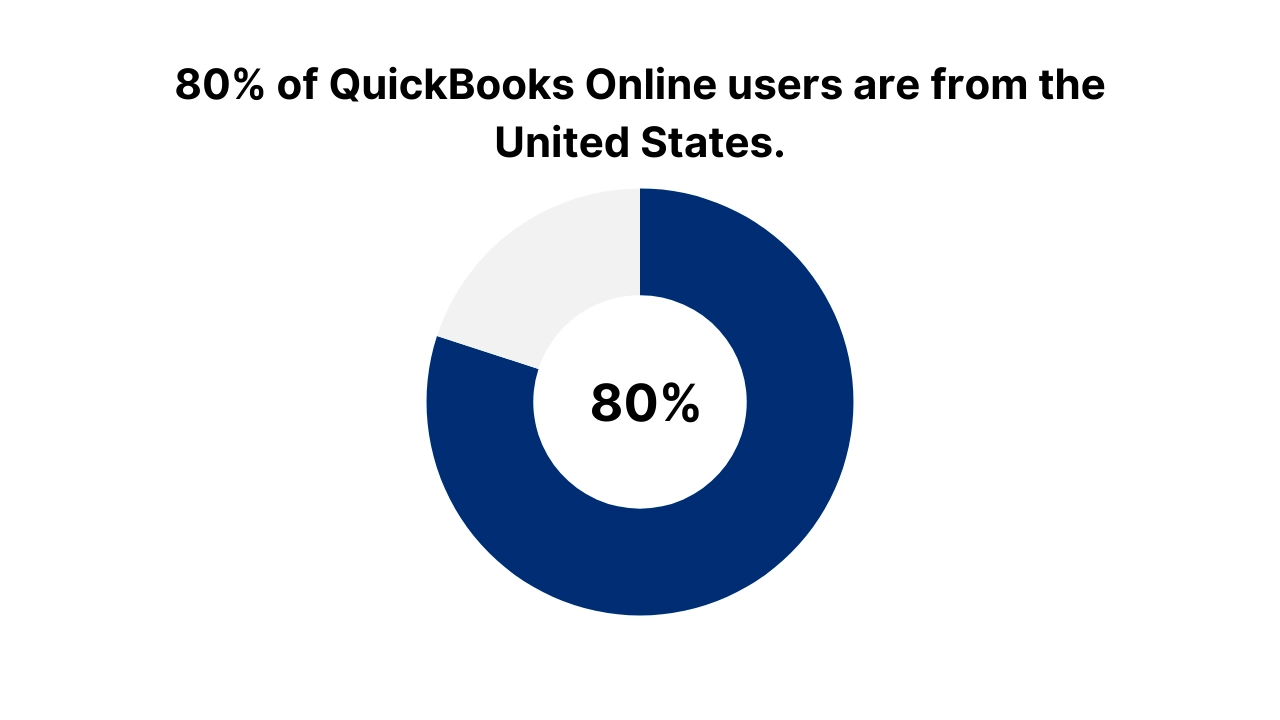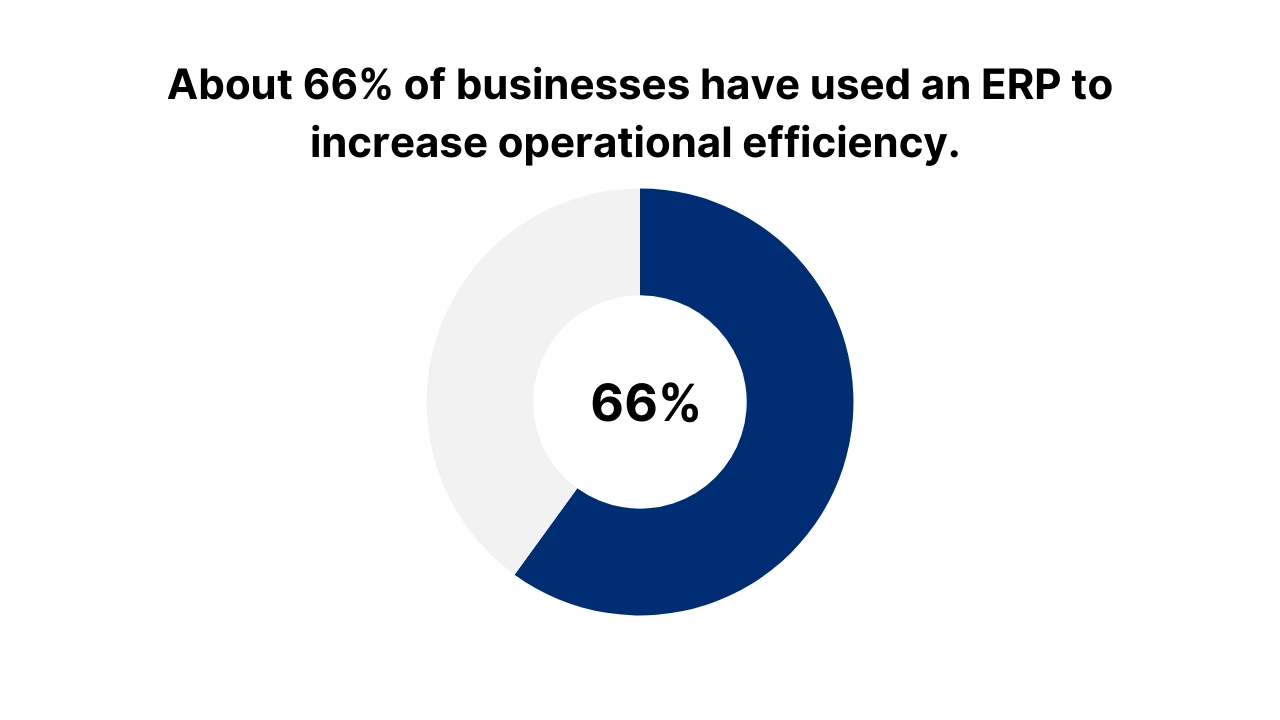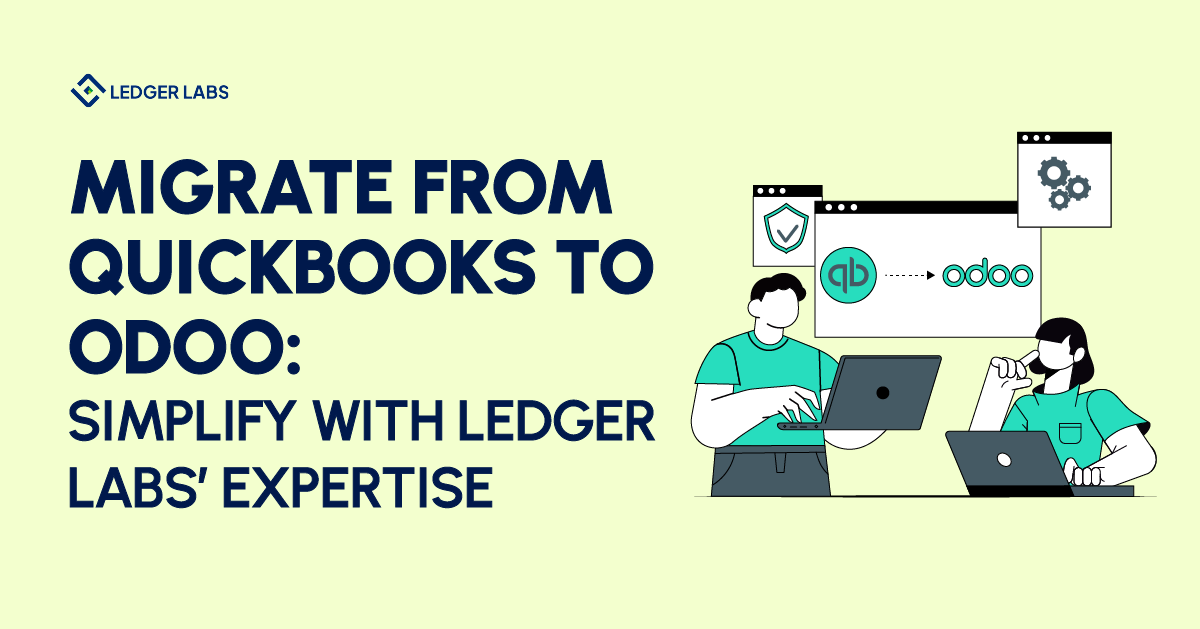Most small businesses start their operations with simple accounting software.
More often than not it is QuickBooks Online, considering its market share of 81%.
While QuickBooks offers solid accounting features, it also has limited options for inventory management.
This usually isn’t a problem. At least not until your business starts growing and a complete business management software, like Odoo, is required.
Odoo isn’t limited to being an accounting software. It comes with several integrated apps within one platform, giving you a more holistic view of your business.
Migrating from QuickBooks Online to Odoo can be intimidating but not when Ledger Labs is helping you do it.
We provide complete support both before and after the migration.
- QuickBooks Online is a popular accounting software with limited inventory management features compared to Odoo.
- Odoo has several applications within one system, so you can access accounting, e-commerce, CRM, and project management tools all in one place.
- You should migrate from QuickBooks to Odoo as the ERP is easy to use. It is flexible and easily customizable to meet your business needs.
- Ledger Labs offers support before, during, and after the migration to ensure you are well-adjusted.
QuickBooks Online vs. Odoo – A quick comparison

QuickBooks Online is a cloud-based accounting software designed for small to medium-sized businesses. It has 5.3 million users worldwide with 80% of customers from the US.
It is the best software for anybody looking to switch their manual accounting to an automated one.
Because it is cloud-based, you can access it from anywhere and on any device. This makes it convenient as you can check receipts, make payments, and review financial reports.
While QuickBooks Online offers a complete financial solution, some of its features deserve to be highlighted.
One of them is expense tracking. It allows small businesses to track, record, and report all business expenses.
You can also automate invoice generation of regular customers. In fact, you can customize the invoice with your brand logo and font preferences.
QuickBooks Online also allows you to track the status of your invoices so that you know whether or not you’ve received payments.
It will also help you send automated payment reminders and follow-ups. Sending and receiving payments on time is essential as it ensures you have enough in the bank to keep your operations running smoothly.
While QuickBooks Online has several accounting features, there comes a point when you need a more sophisticated solution for your e-commerce business accounting.
A standalone accounting software just doesn’t cut it when you also want to track inventory and manage supply chain operations. This is where ERP software like Odoo fulfills the most important roles.
Odoo is an open-source ERP for startups and small businesses making less than 10 million in revenue.
It is highly flexible. It gives small businesses one platform to handle different operations, such as accounting, customer relationship management, and supply chain operations.
You can customize Odoo to meet your specific business needs. So, depending on what you need, you can add and delete applications.

About 66% of businesses have used an ERP to increase operational efficiency. Odoo, a complete business management software, allows you to synchronize data to see the real-time impact of your sales on your inventory and accounts – a feature QuickBooks lacks.
4 reasons to migrate your accounting from QuickBooks to Odoo
1. Highly flexible
While accounting is an important aspect of running an e-commerce business, inventory, and supply chain management aren’t that far ahead. In fact, other operations, like order tracking and customer service are equally important.
QuickBooks Online is a solid accounting software that may serve you well during the initial stages of your business.
However, your needs evolve as your business grows. There comes a point where a standalone accounting software like QuickBooks feels limiting.
What you need instead is an all-in-one business management solution. A single platform with a centralized database that handles your accounting, customer relationships, inventory information, and other relevant processes.
Odoo offers you just that. It has several integrated applications available at a single fee.
You can start using Odoo for only one application and continue to add more as you grow. This feature makes it highly flexible and suitable for different types of industries.
2. Several features at a lower cost
Both QuickBooks Online and Odoo follow a subscription-based pricing model. However, there are a few details that make Odoo a more cost-effective solution for your business.
First of all, Odoo offers a free plan in which you can access any one of its applications entirely free of cost. So if you go ahead with its accounting application and compare it with QuickBooks Online, you’d find that one is available for free, while to access the other, you need to pay a subscription fee.
Secondly, QuickBooks Online chargers per user, just like Odoo, but to access some of its additional features, you have to pay extra. Now you can imagine how the total cost can add up in the future should you seek more license and support.
Odoo, on the other hand, gives you several business management applications at a single price. Whether you want three applications or ten, there will be only one price to access Odoo Enterprise.
Imagine paying for each one of these applications individually. The cost would be too high.
So basically, it is better to subscribe to an ERP that gives you access to multiple applications than software that only handles your accounting.
3. Easy to use and customize
QuickBooks has a user-friendly interface but it does have a learning curve.
It means that professional accountants can easily navigate through the application but it might be challenging for someone without a technical background.
Odoo is a simple software that literally anybody can use. It offers kanban and listicle views to track projects and drag-and-drop functionality to customize your dashboard however you prefer.
You can customize the system to match your changing business needs. You can easily add and remove applications without requiring any technical expertise.
4. Excellent inventory management
Whether you run a retail business or one in manufacturing, inventory management is an important part of your operations.
The good news is that QuickBooks Online offers basic inventory management features. However, it isn’t enough for businesses with complex inventory needs.
Odoo, for example, allows you to track stock levels, manage warehouse operations, and improve order fulfillment processes.
Because of this reason, migrating from QuickBooks to Odoo would be a great decision for a distribution company.
With Odoo, you can track inventory in different warehouses, automate replenishment, and maintain optimal stock levels.
3 challenges faced during data migration from QuickBooks to Odoo
Migrating data from QuickBooks Online to Odoo is an excellent decision for growing businesses. But it does require attention to detail and proper planning. Without it, you can compromise data integrity and disturb business processes.
So before you go ahead, make sure you understand the challenges that may arise when you migrate from QuickBooks to Odoo.
- One common problem that arises when you migrate data from QuickBooks Online to Odoo is the loss of data. Both systems have unique structures and formats due to which many files get corrupted. You can avoid this by planning and preparing the migration from start to finish.
- You might experience performance and speed delays when migrating large amounts of data from QuickBooks to Odoo. You can avoid this by deleting duplicate files and other irrelevant data before migrating.
- Also, make sure you maintain data integrity when migrating it from QuickBooks Online to Odoo. This is sensitive information that you can risk exposing to threats. Make sure you perform data mapping and verify data authenticity every step of the way to reduce inaccuracies.
Pre-migration to post-migration – How Ledger Labs simplifies this integration
Ledger Labs offers support to businesses when they are transitioning from QuickBooks Online to Odoo.
Before the transition, our focus is on reviewing your present QuickBooks Online setup as it helps us understand how to customize your Odoo implementation.
We especially make sure that prior to the migration all data is backed up from QuickBooks and Odoo is configured to meet the new workflow requirements.
Here’s our process in four steps.
1. Developing migration plan
An important step in developing this migration plan is evaluating your current team’s understanding of Odoo. We first figure out how much training is necessary for you to migrate from QuickBooks to Odoo.
We also identify the main applications that your business needs post-migration. Whether it is Accounting, Sales, or Inventory. We try to emphasize those applications the most during our training sessions.
Next, we arrange all the Odoo-related material for you. It includes demo videos, detailed guides, and SOPs that are necessary to create efficient Odoo workflows.
We also highlight the differences between QuickBooks Online and Odoo to make this migration simple and efficient for you.
2. Conducting interactive training sessions and practical support
In our training sessions, we provide you with a complete overview of Odoo.
- We explain to you how the system operates and how exactly it will be different from QuickBooks. We conduct a complete walkthrough of Odoo’s dashboard and its applications.
- Our emphasis is on the applications that you will be using the most. So, for accounting, we will explain to you how you can set up transactions and reconcile accounts.
- We’ll explain how you can create sales orders and manage payments. You will also learn how to track stock levels or view financial reports.
At Ledger Labs, we not only focus on providing theoretical support but also give hands-on experience to your team to make sure you are comfortable with the new system.
This is why we set up a sandbox environment in Odoo. It reduces the chances of altering data structures.
During our training, we’ll conduct mock transactions so that your team can understand how to generate invoices and process payments on their own.
The purpose of this is to build confidence. It gives you a hands-on experience to see how the system works.
3. Detailed troubleshooting
Our support is available post-migration as well. We offer solutions to any potential issues that you might face – whether it be system errors, data discrepancies, or anything else.
We provide your business with ongoing support, monitoring all processes in detail to make sure they run smoothly.
4. Regular check-ins and updates
Odoo requires a lot of updates, so we take care of that for you. This is especially important when you customize the system according to your business needs.
We do regular check-ins throughout the migration process and post that. We need to meet client expectations and ensure they are well-adjusted.
The bottom line
If your business is growing, it is a natural progression for it to shift from QuickBooks Online to Odoo.
While QuickBooks is an excellent accounting system, Odoo is more eclectic, offering several applications within one platform.
Let Ledger Labs be your migration partner for Odoo accounting services.
We’ve been providing technical support to businesses across several industries for the last 12 years now.
Let’s book a consultation appointment to start planning your migration from QuickBooks to Odoo.












